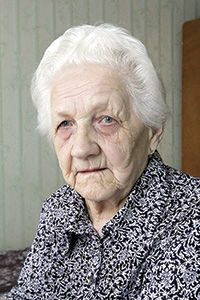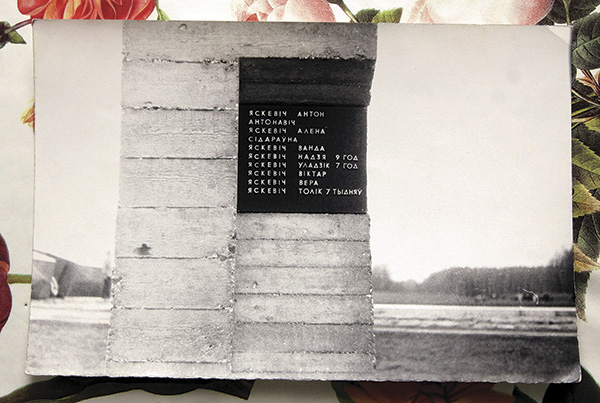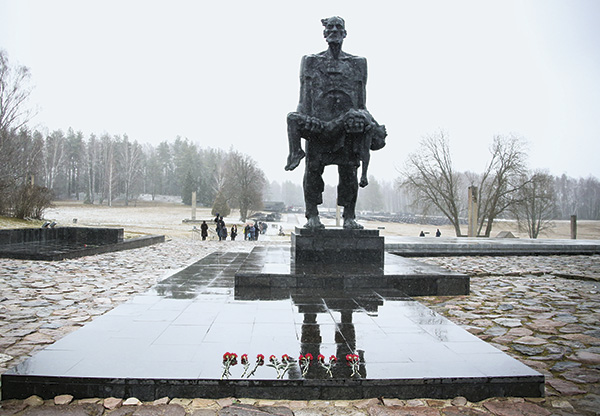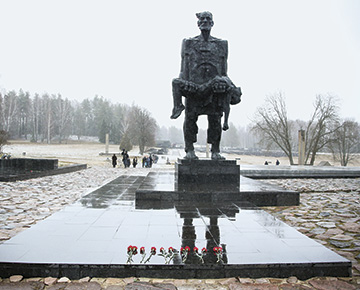
Sofia Yaskevich, who survived
the burning of Khatyn village |
Belarusian Khatyn didn’t die on that day. In fact, it continues to live, despite the murder of 149 residents. Their death stands as an enduring symbol of the fighting spirit, and courage, of Belarusian people. Fascist executioners tried hard to destroy everyone and everything in Khatyn, but failed to do so, since several residents escaped. Five were children: Volodya Yaskevich, his little sister Sonya, Anton Baranovsky, Alexander Zhelobkovich, and Victor Zhelobkovich.
Since the day of the opening of the memorial complex, I’ve collected materials on the tragedy of Khatyn, visiting many times with various delegations, including those from abroad. When I tell them that Khatyn children who escaped now have their own children, grandchildren and great-grandchildren, people can hardly believe it. “How did they escape that hell?” they exclaim. “When all others were burnt alive...”
Especially mistrustful are those who come from abroad. They ask me to repeat the facts, finding it difficult to believe that anyone could have escaped the grip of the Fascist plan. That those children of Khatyn managed to do so perhaps shows a higher justice. They remain witnesses of the tragedy, decades on. Only two of those five remain: Sofia Yaskevich (married name Fiokhina) and Victor Zhelobkovich.
I’ve known Sofia’s family for a long time and have tried to write down everything she’s told me about March 22nd, 1943, and about what happened afterwards. Each time I’ve listened, I’ve felt terrible pain through my heart: how could she endure all that befell her? At that time, two families shared her home: her father Anton Antonovich and mother Yelena Sidorovna, with her younger sisters Vanda and Nadezhda, and her older sister Vera, with husband Victor and little son Vladik (aged only seven weeks) All were burnt alive...

Obelisk in Khatyn. The list of Sofia Yaskevich’s relatives, who died in the fire
“My brother Volodya and I stayed the night with my aunt Anna Sidorovna,” Sofia recollects. “When people in the village started shouting that the Germans had come, Volodya ran out of the house and rushed into the field. He was shot at but not hit, and managed to hide. I remained with my aunt, who didn’t know what to do, because she was frightened. She locked the door, but the Germans were already knocking. My aunt had time to throw me into the cellar, and was immediately shot. The Germans found nobody in the house, and didn’t notice the cellar. They then left the house.”
I was sitting, afraid to move, when smoke began pouring into the cellar, and I started to choke. I had to get out but feared being seen by the Germans! At last, I emerged from the cellar, it being impossible to stay there. All that I saw at that moment filled me with horror and fear. All the houses were burning. There was smoke and fire, and I heard shots and terrible cries. I decided to run from the house of dense smoke, and the Germans didn’t notice me. I got out of the village, and ran to an isolated farmstead, where I saw my brother Volodya, and we escaped together...
Good people took care of Volodya and Sofia at first, then they went to an aunt. At last, they were taken to a children’s home. After the war, Sofia finished vocational school, and worked as a telegraphist in the Brest Region, before becoming a postwoman in Minsk. In 1964, she married Nikolay Fiokhin, who was born in the Vladimir Region. They received an apartment and, for many years, worked in Minsk: Sofia with the post office, and Nikolay as a metalworker at a factory. In 1983, she had to retire due to ill health.
The Yaskevich family, from Khatyn, was large; these days, Sofia’s family is large too. Her elder son, Igor Nikolaevich, has worked as a mechanic at a Minsk poultry farm for 22 years. His wife, Natalia Alexeevna, has also worked at the enterprise for many years. Their daughter, Yelena, is an economist while their son, Oleg, Sofia’s great-grandson, is just three years old. Sophia’s younger son, Fiokhin Alexander, has long worked as a gas welder. Unfortunately, Sofia finds it difficult to talk these days, so her son, Igor, chatted with me instead.

Memorial Day at Khatyn Memorial
Does your Mother ever recollect Khatyn? Does she want to return?
It’s difficult for her. Yet, in spite of her health and age, she summoned the energy to visit Khatyn last year. I took her, with my daughter Yelena. We spent some time where the house used to stand, and placed flowers. Mother cried a great deal.
What was your own reaction to your mother’s grief?
It was painful. Yelena is anxious for her grandmother. My grandson is still small but, when he grows up, we’ll take him to Khatyn. We’ll try to do so on Victory Day, when it will be warm...
English poet Pam Meister wrote emotionally about Belarusian Khatyn:
Heart, calm down.
Die down for a minute,
cool down,
Acquire courage and
resoluteness...
Ashes and your grief, Khatyn,
Will teach us much.
Courageous, you will not allow,
That again the innocent
old people and children
die in fiery villages
And that bells hysterically ring
On an incinerated planet.
Our modern world remains disturbing, with much conflict, and innocent citizens falling victim. When the bells of Khatyn toll it is not only for our painful memories, but in warning. The witnesses of the Khatyn tragedy live; Sofia Antonovna remains with us, and we have a duty to remember.
By Mikhail Shimansky
Photo: Vitaly Pivovarchik, Vitaly Gil
Photo: Vitaly Pivovarchik, Vitaly Gil












